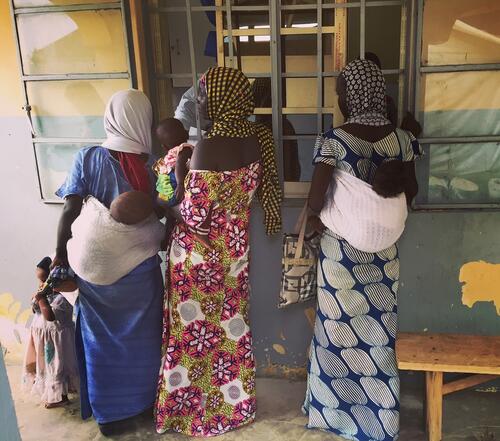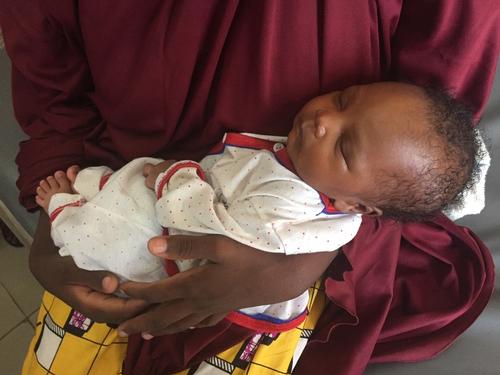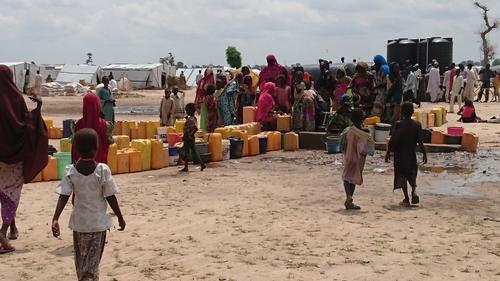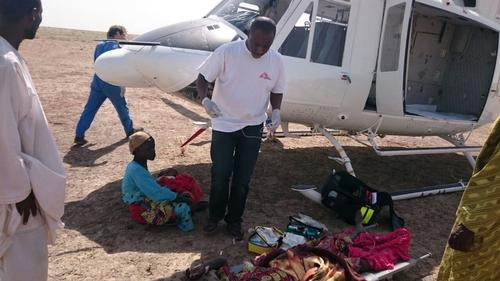Amina, 15, looks like she has the weight of the world on her shoulders. Her small frame seems to shrink further in size as she talks about what she has experienced.
Sleeping on the hospital bed beside her is her son Yaqub, who she gave birth to a few days ago in MSF’s health centre in Maimusari, 15 kilometres from central Maiduguri, the capital of Borno State in northeastern Nigeria.
The MSF health centre in Maimusari is heaving with women and children. Everywhere you look, women are huddled holding their babies or seated on benches waiting to be seen by health workers. I say women, but many of the faces in the crowd are teenage girls like Amina. Some of these girls have given birth to their second or third child.
More than five hundred women and babies are treated every day in the MSF health centre, and more than seventy babies are delivered each week. MSF runs inpatient and outpatient departments, a maternity and antenatal services at the facility, as well as an ambulatory therapeutic feeding centre for malnourished children.
Amina says she is her husband’s second wife. Her husband has five children from his first wife. Amina says she has no idea where he is and he has yet to meet their newborn son.
Amina is from Bama, a town in northeastern Nigeria on the frontline of the ongoing conflict between the Nigerian military and Boko Haram that has left more than two million people displaced and facing a growing nutrition crisis.
Amina was evacuated from Bama and referred to MSF’s health centre in Maimusari. The journey took two and a half hours because the road is in poor condition and also dangerous, dotted with military checkpoints and close to the Sambisa Forest in Gwozah, where Boko Haram are said to have a base.

“I don’t remember the journey from Bama to Maiduguri because I was in so much pain I had passed out,” says Amina. “My youngest sister, Noor, aged five, accompanied me on the journey. Was I scared? I have spent my whole life being scared and so this was no different.”
“It is very hard to be a girl here,” Amina adds. “Many bad things happen to girls; unspeakable things happen, and they start happening to little girls as young as ten.”
Amina twists the fabric of her dress as she talks and looks away frequently, trying to avoid eye contact with the nurse in the room. “What can I tell you; it is impossible for me to talk about these things.”
I ask her how she feels about being a mother. She shrugs her shoulders and then leans back and looks into the distance.
In the same room as Amina, there are two women on beds with their newborns. The older-looking mothers handle their children with more experience and attachment, holding their babies close as they breastfeed them. In one bed there are twins nestling into the blankets they are laid on. Many of the new mothers have expressionless faces. They look utterly exhausted.
Fatima, 35, has given birth to her sixth child. She says her baby was delivered safely by MSF and she is thankful that she had somewhere to turn to in her time of need.
“I felt safe here and knew that I would get good care and my baby would be healthy. I do not know what tomorrow will bring and all I can do is hope for the best for my child and all the children.”
MSF midwife Etsuko Nakamura is doing the rounds in the health centre. In the delivery room, a woman has just given birth and has a retained placenta, which can be life threatening as it can cause infection. Nurses massage her uterus to try and encourage the placenta to discharge.
Another woman is in labour and the staff are preparing for her delivery.
“Our women patients are mostly in poor general health, and for most it is very difficult for them to get to see a doctor because they don’t have the money or their family members do not see it as a priority,” explains Etsuko Nakamura.
“We deliver up to fifteen babies daily; many of the women have had repeat pregnancies and deliveries in a short space of time,” Nakamura adds. “Their bodies are weak and exhausted. As always with our work, we see the daily impact of conflict and poverty. We see how women and children’s lives are made harder by violence and instability. It is the women and children who are the most vulnerable and suffer the most.”






